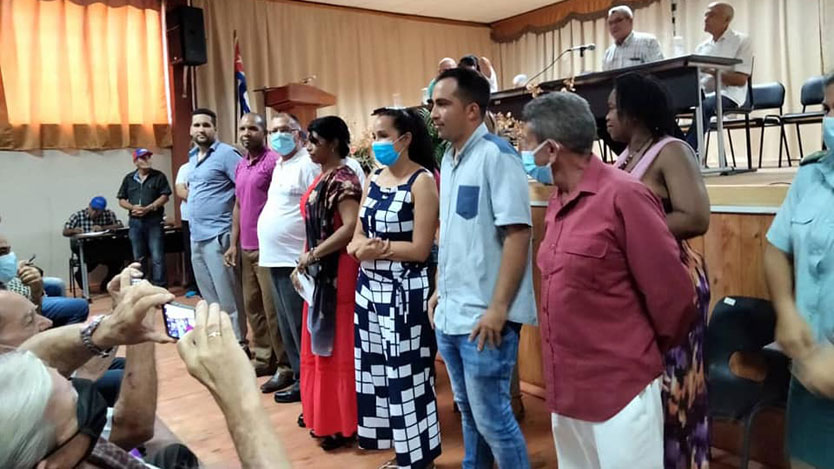
That "the flame and the pride of belonging to the organization have to be fanned", emerged as an essential and dominant idea in the debates and reflections that, this Saturday, led to the general assembly of the Ciego de Ávila branch, belonging to the National Union of Historians of Cuba (UNHIC).
The urgency of the mandate was formulated in this way by Yuslaivys Borges González, a member of the Provincial Bureau of the Party, and so did the majority of those who intervened through other terms, including calls for greater unity and coordination of actions that have repercussions on a greater impact on the community and to achieve greater visibility and scope, to the point that the UNHIC transcends national borders, in the face of the media avalanche with which it is intended to distort the reality and history of Cuba.
This was the case of Omar Martínez Arcia, when he referred to the need to live and revitalize the organization, in accordance with the historical moment and the dynamics that we are experiencing, so that the messages are "refreshed", as well as the ways and means used, in order to influence, from the youngest, in their contemporaries and in childhood.
Israel León Martínez, Doctor of Pedagogical Sciences and head of the Department of Philosophy and History at the University of Ciego de Ávila Máximo Gómez Báez, advocated “communicating more, relating more, seeking greater rapport from specific strategies that do not go much to theory , but to practical things that give us the measure that there is an effectiveness in what we do.
"We have a lot of material in digital format that we do not use, how many museums do we have virtually and do we not use them with the depth they deserve, having a (virtual) specialist next to us," he reflected.
A recurring issue became the analysis of the situation of the teaching of history in the different teachings, with emphasis on the lack of preparation and the bungling, when the correct thing is not done in spaces such as morning sessions, reflection shifts, and training civic inside and outside the classroom, the class and the community.
Another of the problems, the poor functioning of the Monuments Commission in the municipalities, a structure that is chaired and directed by a government representative at that instance, motivated the decision of the UNHIC that commissioned "that each base section be responsible for the attention to a bust, a plaque or a monument”. Such an indication of the national president will cause that, at least in 29 of the worst attended in the territory, change the panorama.
It also transpired that, although the decision to form part of the UNHIC is voluntary, it is obvious that intentional work has been lacking to add valuable personnel to the ranks, as is the case of professors and teachers with mastery of historical science, as well as managers and technicians from the cultural sector, especially those who work in museums.
The good examples and practices that can be multiplied in a part of the local membership, which remains passive, were reiterated in the meeting: Orelvis Hernández Mendoza, with his recognized work in Lázaro López; the Brigadier José Ambrosio Gómez Cardoso Provincial Historical Archive collective; and museums such as those of the Morón and Ciro Redondo municipalities, among others.
Jorge Luis Aneiros Alonso, national president of the UNHIC, insisted that it is up to the Avilanian branch to guarantee the active participation of its members in the broad system of scientific events sponsored or co-sponsored by the organization.
He said that the main responsible for the disclosure of the story corresponds to the public media, but "with them we must collaborate" and that it is everyone's responsibility to consciously insert themselves in the social networks of the Internet, where "much remains to be done", in addition of the imperative of achieving the stable presence of the subsidiary in that area.
Aneiros Alonso specified that “the ministerial resolution that is going to govern municipal historians in Cuba is being discussed, who chooses them, what they are going to do, how long their mandate will last and what their salary will be.”
He recalled that the UNHIC has its own stimulation, which includes the Provincial Prize for History, instituted two years ago, and state decorations.
On June 17, the anniversary of the death of Máximo Gómez Báez, the national commemorative day will begin for the Cuban Historian's Day, which will last until July 31, the date on which Eusebio Leal Splenger died.
As part of the Provincial Committee, Sixto Rolando Espinosa Dorta was elected as president -the only member of the previous structure (executive) that remains-, and a broad youth representation will assume the leading role that the plenary also demanded, which recognized the previous work and He delivered diplomas to that effect to Félix Jorge Guerrero, José Martín Suárez and Cecilio Jiménez Marroquí.
